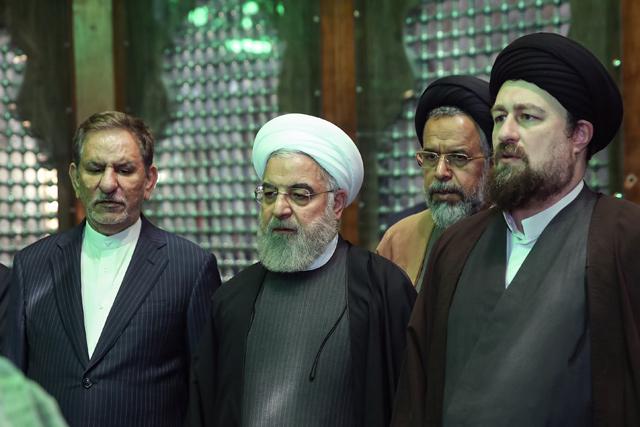You are here
Iranians must have ‘right to choose’ at polls — Rouhani
By AFP - Feb 02,2020 - Last updated at Feb 02,2020

This handout photo provided by the Iranian presidency on Sunday shows President Hassan Rouhani (centre) visiting the mausoleum of the late founder of the Islamic Republic, Ayatollah Ruhollah Khomeini, while accompanied by First Vice President Eshaq Jahangiri (left) and Khomeini's grandson Hassan Khomeini in southern Tehran on the occasion of the 41st anniversary of Khomeini's return from exile (AFP photo)
TEHRAN — Iranians must have the "right to choose" between different political movements, President Hassan Rouhani said on Sunday, as controversy grows over the disqualification of thousands of candidates in upcoming polls.
Speaking at the mausoleum of Ayatollah Ruhollah Khomeini during annual celebrations of the 1979 revolution, Rouhani, a moderate conservative, praised the political heritage of the Islamic republic's founder.
"The imam [Khomeini] insisted on the fact that people must participate in all elections and have the right to choose,” Rouhani said during the address, broadcast on state television.
"Whoever prevents people from choosing... and whoever discourages people from going to the polls, is certainly far from the approach of the imam,” he added, surrounded by members of the government.
Controversy has been raging for the past fortnight, pitting the coalition that supports Rouhani's government against the guardian council, which oversees Iran's elections and is dominated by ultra-conservatives.
The council says it has barred some 9,500 potential candidates from standing in the February 21 legislative polls — almost two thirds of the 14,500 hopefuls — including 92 sitting MPs from of all political stripes.
Those who are barred are allowed to appeal before the election.
Tough situation
Rouhani, paying homage the "father of republicanism in Iran", said Khomeini had refused to establish a "caliphate" and instead "chose the Islamic republic" after the victory of the revolution against the shah's rule.
The US-backed government of the shah fell on February 11, 1979, 10 days after Khomeini's triumphant return from exile.
Rouhani made reference to the failed constitutional revolution in 1905 — the first attempt to establish democracy in Iran — with the restoration of an absolute monarchy some years later.
He warned that the same could happen to the Islamic republic if elections became a mere "formality", with weak turnout.
Since mid-January, the president has repeatedly sought to mobilise the electorate, as some analysts predict his alliance of moderates and reformers will take a beating.
Last week, Rouhani warned of threats to the Islamic republic's "democracy and national sovereignty" after the disqualification of the candidates.
He said on Sunday that the nation had held up well against unprecedented US pressure because Iranians "are convinced that the oppression and aggression comes from [foreign] tyrants".
He was referring to tough economic sanctions that the US has imposed on Iran since 2018 as part of President Donald Trump's "maximum pressure" campaign.
"If we follow the path of the imam [Khomeini]... we will overcome the current situation, which is the toughest in the economic and political history" of the Islamic republic, Rouhani added.
Related Articles
DUBAI — Four-fifths of candidates for the body that will choose Iran's next supreme leader have withdrawn or been disqualified including a g
TEHRAN — Iranian President Hassan Rouhani called on Tuesday for a massive turnout in next month's parliamentary election, which look set to
TEHRAN — A presidential election in Iran next month could provide the final straw to split an already long-divided conservative political ca











